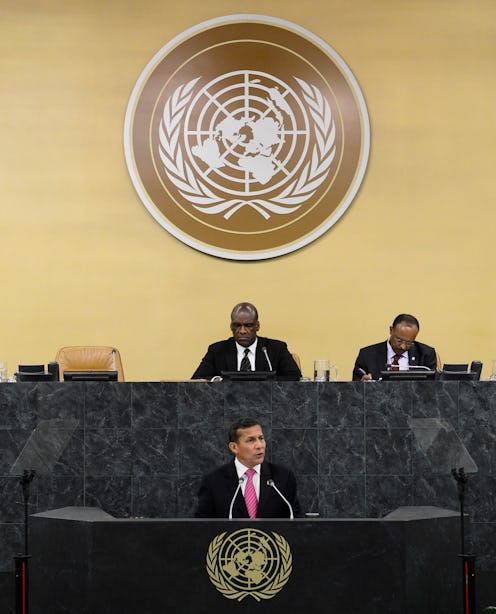News
What's Been Happening At the UN General Assembly?
No handshake occurred Wednesday between President Barack Obama and Iranian President Hassan Rouhani, a big letdown for those who thought they'd see history if the leaders greeted each other face-to-face for the first time in 30 years.
But the interaction would've been "too complicated," according to White House officials. "For them, it was just too difficult for them to move forward with that type of encounter at the presidential level, at this juncture,” a senior official told the New York Times. Though the White House had let speculation buzz that such a handshake would occur, hopes sank when Rouhani didn't turn up to a lunch courtesy of Secretary-General Ban Ki-moon, which would have been the best time for said handshake. Still, analysts say that their near-miss won't affect the outcome of talks regarding Iran's nuclear-weapons program.
During his address to the UN General Assembly, President Obama said that he was open to the idea of improving diplomatic relations with Iran but that skepticism over the country's nuclear program would have to be addressed before any meaningful headway could be made. He re-iterated that he would not allow Iran to acquire a nuclear weapon.
The two countries will move ahead with plans for Secretary of State John Kerry to meet with his Iranian counterparts to discuss reopening the lines of diplomatic communications between the two nations.
But while many were busy being bummed out about the lack of Iran-U.S. contact, the U.S. continued to make its case for closely monitoring Syria's compliance with plans to hand over their store of chemical weapons. In a meeting with Syrian Opposition leaders on Tuesday, disappointment was expressed that the U.S. had averted a military strike on the regime of Bashar al Assad in response to a chemical attack outside of Damascus.
Another milestone of this year's General Assembly is a seven-nation commitment to climate change, as marked by an initiative called the Global Commission on the Economy and Climate (GCEC,) which was launched Tuesday. It will place emphasis on the cost and profits of combatting climate change, which its leaders hope will be more conducive than focusing on climate-change emissions, as has been done in the past.
Meanwhile on Wednesday, John Kerry was busy signing a controversial arms treaty. According to the State Department, the UN treaty will "reduce the risk that international transfers of conventional arms will be used to carry out the world's worst crimes." The treaty would require all consenting countries to come up with a system for regulating the transfer of weapons and their component parts, as well as arms dealers.
Despite assurances that gun rights would be protected, some groups, including the National Rifle Association and conservatives like Senator Bob Corker (R-Tenn.) strongly oppose the treaty. Corker wrote to the president asking for implementation of the treaty to be put on hold until its approved by the Senate. "The administration is wasting precious time trying to sign away our laws to the global community and unelected U.N. bureaucrats," he wrote.
Laws surrounding gun control have been a particularly touchy subject around Capitol Hill since a stricter policy, written after the massacre of over 20 first graders in Newtown, Connecticut, was defeated. Since then, the recent shooting rampage at the Navy Yard in D.C. has reignited the debate among lawmakers, though morale remains low for any real change.
